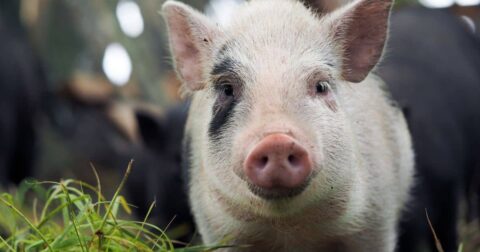News
GLP-1 Users Lose Weight, and Their Taste for Meat
Research•3 min read
Reported
We're curious about animal intelligence but we might not want to believe it.


Words by Björn Ólafsson
We really don’t understand animals.
Sure, we love them when they’re cute. Think of mystery-solving Great Danes, cats in Halloween costumes or hamsters fake lip syncing to TikTok trends. We’re also fascinated by their smarts. According to Google search volume measurement tools, there are 3.6 thousand searches for the phrase “most intelligent animals” each month on average.
Yet despite that affection and curiosity, we raise and kill billions of animals every year for food.
So, how are we able to do this?
A new study from researchers at the University of Kent attempts to answer this question. The authors found that even when they presented people with evidence of animal sentience, study participants didn’t quite adjust their perceptions in line with the new information. In other words, just seeing facts about animal intelligence doesn’t mean we’ll believe them.
To understand why humans do this, you have to understand the meat paradox. First coined by psychologists Steve Loughnan, Nick Haslam, and Brock Bastian in 2010, the theory explores an inconsistency between human belief and action.
Humans are able to believe animal welfare is important while also continuing to eat meat. 65 percent of Americans are uncomfortable with factory farming methods, with 81 percent believing that animals can feel pain just like humans do. Yet 98 percent of Americans purchase products from the very factory farms they say they disdain.
Researchers are continuing to unravel this meaty mystery. Psychologist and philosopher Elisa Aaltola argues that the paradox stems from cognitive dissonance (holding in mind two conflicting opinions), strategic ignorance (avoiding evidence of animal cruelty), and an avoidance of empathy (dissociating the meat from the animal it came from). In addition to these personal factors, societal pressure and, of course, your tastebuds play a big role.
In this latest study, 801 meat-eaters and non-meat-eaters (either vegan or vegetarian) were given a test. They first rated 16 various aspects of pig cognition and sentience on a scale from 1 to 100 — including their empathy, their organizational abilities and their emotions. Then, half of the participants were given statements about pigs that indicated sentience, while the other half read about a lack of sentience.
Participants were told that most of these statements on sentience were true but one-third were false, a research tactic borrowed from political science research to examine how our beliefs change. Then, after reading these possibly-true, possibly-not statements on pig sentience, participants rated the same 16 aspects of pig cognition all over again. The researchers compared the difference in belief (before and after the experiment) to what a perfectly logical person would do when making decisions.
The good news is that both meat-eaters and meat-abstainers were able to update their perception of animal sentience when given new information. But here’s the catch — the participants didn’t update their previous beliefs in a logical way. In fact, the participants overcorrected their beliefs in a negative direction and undercorrected them in a positive direction.
In other words, if you showed a meat-eater information suggesting pigs were sentient, they might be a little bit more likely to believe pigs were sentient. But if you showed them information suggesting the opposite, that pigs weren’t sentient, well, they would overcorrect. They’d be far too confident that pigs are dumb as doornails.
In the words of the authors, “people have a tendency to underestimate the likelihood that animals have minds.”
Our decisions affect animals. Everything from which sandwich we order at a local cafe to expansive wildlife policy choices – we make decisions about the worth of animal lives constantly. This research casts doubt on our ability to make logical choices when presented with new information.
A 2020 psychology study shows that our belief in animal minds is an accurate predictor for how we choose to use animals. Put simply, if we believe animals are capable of thought, we’re less likely to want to use animal bodies for food, testing, or clothing.
But this new study shows that updating our beliefs, and therefore our behavior isn’t quite so easy. We might just be hardwired to reaffirm whatever beliefs we already have about animal intelligence and animal stupidity — predisposed towards using animals as commodities.
These biases have devastating real world consequences. Last year, the Swiss electorate voted against replacing animal testing with alternatives.
Across the board, in nearly every environmental conference, from local to global to everything in between, the fates of animals is usually a footnote, if even mentioned. This, despite the fact that animals are already feeling the devastating effects of climate change and land use change far faster than us humans.
And perhaps above all, it is estimated that the average person will personally eat around 7,000 animals during their lifetime, a figure almost difficult to believe. Perhaps these actions are only possible because of our imperfect cognitive hardwiring.
Understanding the non-human mind
The limits of what the human mind can comprehend also limits our research of animal sentience. We don’t know what it’s like to have multiple brains like octopuses, more color detectors like mantis shrimps, or an ability to sense the Earth’s magnetic field like salmon. Our ability to understand the minds of non-humans is already inherently limited by our subjectivity. To paraphrase the American philosopher Thomas Nagel, who argued that consciousness is an inherently subjective experience, we will never know what it’s like to be a bat.
While true empathy of animal minds is inherently impossible, the best we can do is sympathy, drawing on what we know about their brains are capable of cognition and emotion. Of this, more and more science is coming out. Study after study after study show that animals are cognitively complex, displaying empathy, planning, memory, learning, and more. Pigeons can guide nuclear warheads. Great apes can learn language. Grey parrots can make probability assessments.
All of this is understood by the scientists who study these creatures. But not necessarily by the rest of us. The question is this: how can we truly understand animal minds if our cognitive biases are urging us to devalue non-human sentience?
The original study offers a hint: even though the participants undercorrected their beliefs about dog intelligence when given new information, overall they rated dogs, so-called man’s best friend, as more cognitively capable than pigs (though most research says the opposite).
Perhaps then we need to spend more time with animals to overcome our biases about their intelligence, as we have with dogs for centuries. What would this look like? Visits to farm sanctuaries? More nature documentaries? Anti-speciesist training?
I don’t know the answer. But as long as the fates of billions of animals rests in our hands, we at least need to try.